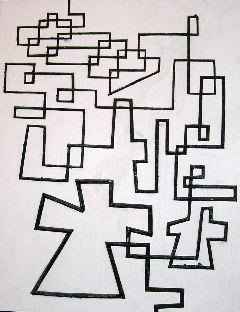
The inspiration for this expedition up the front face of Op. 131 of Beethoven arose like the phoenix out of the ashes of two separate meetings. The first has been simmering for years since the moment my non-musician brother challenged me to prove that the Lento assai movement of Beethoven’s Op. 135 was of more import to the human race than the popular melody, “White Christmas.” Unfortunately, no one yet has set up a foolproof standard of measure for a musical composition that avoids value judgments involving subjective or cultural attitudes.
The second reaction was the result of a green tea discussion in Wei Ming Tu’s Berkeley garden a month ago. Wei Ming is a remarkable Chinese scholar, so when he spoke about Mencius and the application of this great Confucian’s analysis of human nature to the aesthetic realm, the very idea inspired a continuing internal dialogue of my own on how Mencius might have regarded a late Beethoven quartet.
The philosopher, known today as Mencius, was Meng-Tzu or Master Meng, born a little over 100 years after the death of Confucius in the area of modern Shantung province. He became, after the master, the greatest influence on the school of Confucianism in China. He believed that human nature was essentially good and evil, evolving only as one strayed from his original ability to love and commiserate, to distinguish right from wrong.
I would begin the farfetched connection by stating that Beethoven shared Mencius’ belief in man’s inherent good nature. Up to the year 1823, Beethoven commanded the serious respect, love and admiration of his fellow musicians and the entire European musical community. However, as his deftness increased, he retreated into the silent places where his incredible imagination roamed. The musical world found it more and more difficult to follow him. Thus, that extraordinary musical mountain range known to us as the Late Quartets came into being, lifted into dizzying stratospheres during the four last years of Beethoven’s silent existence. Noise, spoken words and other musicians’ music could not reach him and his inner him and his inner creative furnace, like that of the uninhibited Hawaiian goddess Pele, forged into musical reality, terrifying peaks: teeming with unscalable cliffs, well protected by strange foothills of mystifying musical material that even the experience musical explorer and climber could not easily traverse.
It took only three years for Beethoven to create five separate, unique musical mountain massifs with at least one unclimbable
Everest, the Great Fugue. The year 1824 saw the composition of Op. 127. Op. 132 and Op. 130 with the fugue were completed in 1825. Op131 and 135 and the last Rondo for 130 were finished in 1826 a few months before Beethoven’s death in early 1827.
Everyone was awestruck or mystified as to how to approach these works. The first attempt on Op. 127 by Beethoven’s Schuppanzigh Quartet failed. By the time Beethoven died, he had watched (he could not hear) the attempts on Op. 127, 132, and 130. By the year 1875 there is evidence of at least 1039 expeditions up the various late Beethoven peaks, 260 on Op. 131 alone. Even New York City had witnessed three attempts on Op. 131. Boston two.
But while the musical world has become more and more involved and obsessed with the meaning the late quartets and their challenge to the human body and spirit, the comprehension and success remains almost as elusive and unique as when they first appeared on the human horizon. Out of my over 40 years of grappling with these five giants has come my deep conviction that they represent the most important influence of my musical life.
Yet I would be the first to disclaim that I comprehend what Beethoven intended. It is possible to suspect that even Beethoven didn’t fully comprehend what he had wrought. That is why I turn to the ancient sage, Mencius for help. Mencius postulated six exceptional steps up the ladder of “self-cultivation.”
He who commands our liking is called (Shan) –– Good.
He who is sincere with himself is called (Hsin) –– True.
He who is sufficient and real is called (Mei) –– Beautiful.
He whose sufficiency and reality shine forth is called (Ta) –– Great.
He whose greatness transforms itself is called (Sheng) –– Sagely Profound.
He whose profundity is beyond our comprehension is called (Shen) –– Spiritual.
Wei Ming Tu wrote that Mencius maintained that this spirituality, this greatness that transforms itself that is beyond comprehension, represents a symbol of a higher station of being on the very same path as good, truth, and beauty. He believed that while few might attain spirituality, it was a potential for all. I might paraphrase this to say that while few might create, as Beethoven did, the path for the interpreter, performer, and the listener is potentially the same path that Beethoven traveled.
Mencius reveals a clue in the approach to late Beethoven when he emphatically states that the way of learning consists of none other that the quest for the lost heart, when he holds that the body can hardly express the feelings of the heart even though it is the proper place for the heart to reside. The Mencian heart is both a cognitive and an affective faculty. It not only reflects on realities, but, in comprehending them, shapes and creates their meaningfulness for the human community as a whole.
For Mencius aesthetic language (such as embodied in Op. 131) was not merely descriptive, but it suggested, directed and enlightened. To respond to such a work, both the performer and the listener must bring to it what Mencius viewed as the vital spirit endowed with what might be termed matter-energy, a power connected to breathing and blood flow. Authentic music therefore does not create a fleeting impression on the senses but possesses enduring virtues. By looking again at Mencius six stages of human self-cultivation, we may find in them just that elusive standard of measurement for artistic value.
Stage 1: That music which commands our liking is called good. That music is good which is entertaining, which is understandable, that pleases. That music is good which you wish to experience again, that intrigues, that does not offend. That music is good which one may not like but which is liked by others.
Stage 2: That music which is sincere with itself is called true. That music is true which delivers what it promises, which is consistent, logical, unassuming, which speaks in its own voice, adhering to its own way whether it be pleasing or not.
Stage 3: That music which is sufficient and real is called beautiful. That music is beautiful which is both substantial and conclusive, which stands for something no matter how big or small. That music is beautiful in which the emotions of affect may strain or challenge the boundary of the form, but never distort or destroy it.
Stage 4: That music whose sufficiencies and reality shine forth is called great. That music is great which arouses tingling of the spine, open breathing, the formation of tears. That music is great which not only stands apart from other music of its kind but contains special magical moments or lucky accidents (as Stravinsky calls them). That music is great which one is drawn towards and held a willing captive no matter how much one has experienced it previously. That music is great which, when experienced, remains enduring and memorable.
Stage 5: That music whose greatness transforms itself is called profound. That music is profound in which the whole is greater than each part, which in effect transforms the person experiencing it. That music is profound which, when it is simple, appears complicated, and when it is complicated appears simple. That music is profound which, as it appears to become something new or other than it has ever been previously.
Stage 6: That music whose profundity is beyond our comprehension is called spiritual in which the vital force does not drain but recharges the emotional state of the listener. That music is spiritual which mixes the logical with the illogical, the rational with the irrational, whose physical manifestation is always ingenious. That music is spiritual in which one can know every sound and silence, may even have an understanding of its physical properties, yet whose effect while spellbinding, powerful and entreating for comprehension, nonetheless, in the last analysis remains unfathomable, mysterious, elusive and tantalizing.
I submit to my non-musician brother, that while “White Christmas” possibly creeps up to Stage 3 on Mencius’ scorecard, Beethoven’s Op. 135, and indeed all of his late quartets pass every test of greatness and spirituality, hands down. While Op. 131 might be beyond our comprehension, Mencius certainly described Beethoven when he wrote “The great man does not lose his childlike heart.” Beethoven pronounced each of his last creations great, “each in its own way,” but later was quoted as saying that Op. 131 was his very best.
{Robert Mann, founder of the Juilliard Quartet in 1948, and its first violinist, is one of America’s most distinguished chamber musicians. The article, “A Confucian’s View of the Late Beethoven Quartets, is based on a lecture he gave early last month at the Aspen Institute for Humanistic Studies, preceding a performance by him and three others of Beethoven’s Op. 131}






